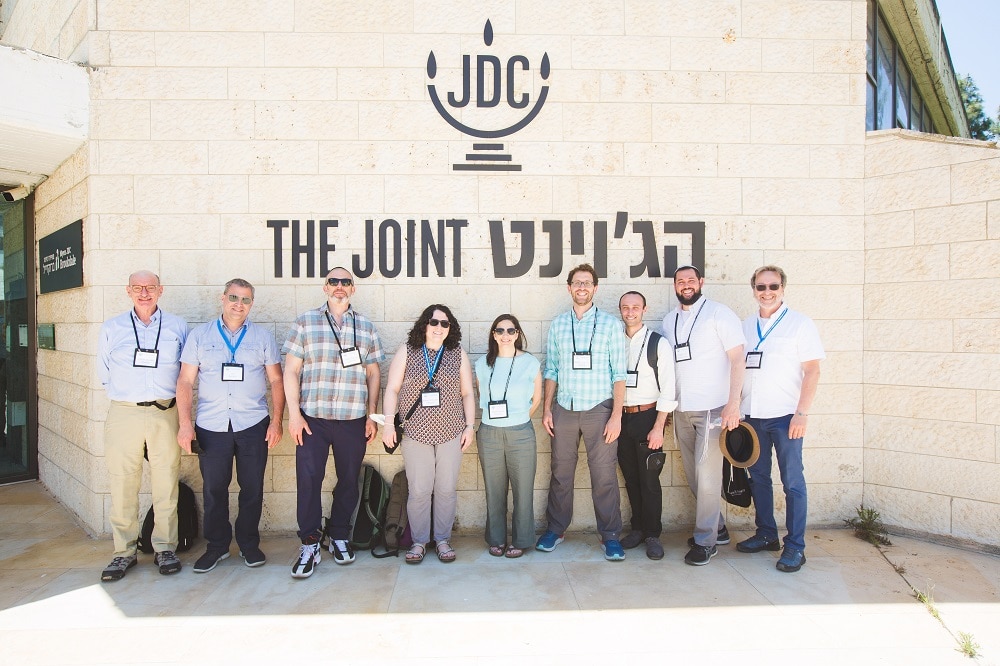-
20 May 2022

Pictured: (l to r) Rabbi Daniel Zemel, Gil Preuss, Rabbi David Spinrad, Rabbi Deborah Megdal, Rabbi Sarah Tasman, Rabbi Aaron Potek, Rabbi Mitch Berkowitz, Rabbi Uri Topolosky, and Rabbi Evan Krame visit JDC’s Israel headquarters.
I recently wrote about our responsibility as American Jews to open our eyes and hearts to the incredible and imperfect Israel of today; a modern society that may feel quite different from the Israel of our memories. Far too often, we either long for an Israel from another era or only see the extremes as highlighted in the news.
This week, as I led Federation’s Rabbis Mission to Israel, I consciously used this as the lens through which to see and experience a country I’ve lived in and have visited countless times.
This perspective became even clearer as our group – eight rabbis representing a cross-section of denominations and spanning DC, MD, and Northern VA – listened to the voices shaping Israeli society today and began to rewrite our own Israel narratives.
On our first full day in Israel, our group met a Ukrainian family who discovered their Jewish heritage just one year ago, when they first connected with their biological mother and learned that she was Jewish and living in Israel. When the war in Ukraine broke out, the family decided that making Aliyah (immigrating to Israel) would be their future. Today, they have started new lives in a new country and community.
We also learned the story of Takele Mekonen, an Ethiopian Jew who left his homeland in 1980 for Israel by way of Sudan, walking more than 372 miles over 31 days alongside 20 friends. There, he worked with Mossad, Israel’s National Intelligence Agency, for a year and a half to bring nearly 1,000 Ethiopian Jews to Israel before finally making the final leg of the journey himself. Today, he runs an organization helping other Ethiopian Jews develop professional technology skills.
Of course, while these inspiring stories of resilience are a crucial element of Israel’s story, they are only one piece of it.
The next day, we visited Lod and Ramle – two cities with significant Jewish and Arab populations that faced protests last May during an outbreak of violence in the region. However, the similarities stop there. In Lod, the challenges and divisions between Jewish and Arab residents continue. National political battles are being fought within the city and some leaders have sought to use the crises to support and strengthen their own positions. Few efforts have been developed to focus on the needs of the whole. Leadership and relationships matter.
In Ramle, on the other hand, relations have been reestablished as residents seek a collective path forward. Leadership has worked together for 13 years to address ongoing issues and reduce tension with a focus on strengthening the city for all residents, eliminating external provocations, and focusing on what’s best for the city. They have worked hard to get to know each other, including the needs that they each may have in their particular communities. The differing outlooks and approach of each cities’ leadership have played a substantial role in the two drastically different paths. Both are clear examples of how and why leadership and relationships matter.
On our final day in Israel, we met with a series of leaders from various spheres of Israeli life, including Mizrahi Jews, Israeli Arabs, and religious Zionists, all whom are building bridges across historic divides and seeking to learn from others unlike them.
Through these conversations, and across our learnings and travels, we witnessed leaders from all walks of life come together to meet and get to know each other; to learn about the other and through that process learn about themselves. Through each individual conversation, these leaders are seeking to build a new Israeli society not defined by their divisions but by understanding the other and searching for ways to create something new.
Within a context that is far too often shaped by extremes, it is critical that we elevate the voices and impact of those seeking to work together, not through a naïve idealistic lens, but rather through a commitment to build an Israel that is for both for the Jewish people and for all its citizens.
For more reflections, perspectives, and photos from our mission, visit our website.
Shabbat Shalom,
Gil
Sign up here to receive future weekly reflections.
